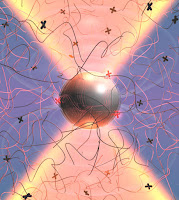Nature
itself is a system with all parts entangled. Systems are like a human body:
they are consisted of parts, and those same parts affect the performance of the
whole. All the parts are interdependent. Just like a team of players during a
game. But the team is not alone. They have the counter-party, there are judges,
there are physical constraints engaged, and also spectators may be present. All
of this forms a system. Times and circumstances may change, but systems tend to
endure. If we don’t understanding this, wrong decisions, sometimes disastrous,
can happen.
Also an
organization is a system – a “living” system that performs by its own “will”. Rather
than focusing on organizational goals and values, the management practice, when
complying with the bureaucratic processes, sets the latter as the ultimate
objective. Systems take on a life of their own and seem immune to common sense.
When members of an organization feel as though, by circumventing established
rules and procedures, they must constantly fight the system, the result can lead
to cynicism, poor ethical climate, or forces them to jump from one urgent
matter to another instead of worrying about important ones.
 Unfortunately
some professionals are not trained regarding system thinking during the
schooling period. And believe me, when dealing with system thinking there is a
huge difference between professionals with natural science background and those
that come from other fields.
Unfortunately
some professionals are not trained regarding system thinking during the
schooling period. And believe me, when dealing with system thinking there is a
huge difference between professionals with natural science background and those
that come from other fields.
The natural
science is usually thinking in terms of multiple levels of systems, each of
which, through research, is capable of relatively stable definition. In
physics, for example, at the level of ‘Brownian Motion’ although an individual
particle behavior is random, at the group level it is predicable.
| Systems thinking about the society (Photo credit: Wikipedia) |
In social
sciences systems are less stable and behavioral ‘laws’ are influenced by the
shifting attitudes of participants. A human behavior is more subject to
influence and introspection and hence less predictable. This, in organizational
behavior and change, leads to the tendency to deal with problems from less
well-defined systemic perspectives.
The best professionals in the leadership area tend to have a dual
grounding on both the natural and social science to properly lead people. They
have the “virtue”.



System thinking with new Mindset. - A Rational Mindset is Result of the Positive Critical Thinking.
ReplyDeleteYes, and feedback with test as well?
Delete